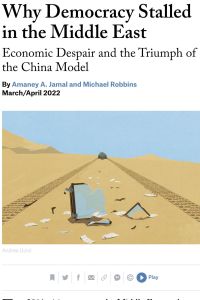
Why Democracy Stalled in the Middle East
Economic Despair and the Triumph of the China Model
Recommendation
Democracy and economic opportunity appear to be inversely correlated in the Middle East, according to this intriguing analysis from regional experts Amaney A. Jamal and Michael Robbins. They note that the 2011 Arab Spring was as much about the need for economic improvement as for political freedom. But in the years since, the economies of those countries in which democracy progressed have faltered, but where autocracy has succeeded, economic grievances have abated. The authors conclude that, in the Middle East, economic change must accompany political reform.
Summary
About the Authors
Amaney A. Jamal is a co-founder of Arab Barometer, a research group, and the dean of the Princeton School of Public and International Affairs at Princeton University. Michael Robbins is the director and co-principal investigator at Arab Barometer.








Comment on this summary